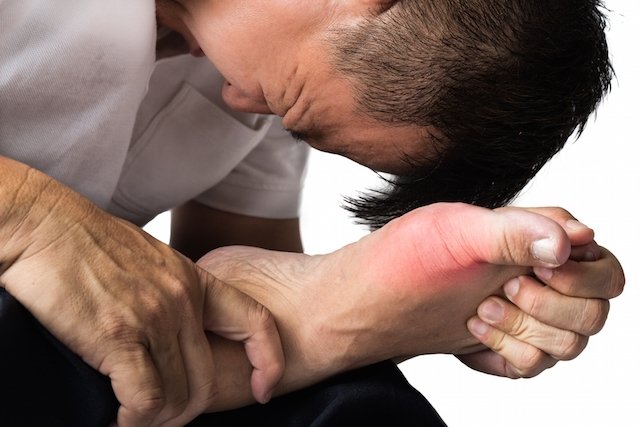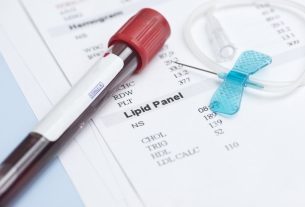Uric acid is a substance formed by the body after the digestion of proteins, which form a substance called purine, which then gives rise to uric acid crystals, which accumulate in the joints causing intense pain.
Normally, uric acid does not cause any health problems as it is eliminated by the kidneys, however, when there is a kidney problem, when the person ingests a lot of proteins or when their body produces excess uric acid, it accumulates in the joints, tendons and kidneys, causing origin of gouty arthritis, also popularly known as gout, which is a very painful type of arthritis.
Excess uric acid can be cured, as its imbalances can be controlled through a balanced diet, increasing water intake and eating a low-calorie, low-protein diet. Furthermore, a sedentary lifestyle must also be combated, with regular moderate physical exercise. In some cases, when there are very intense symptoms, the doctor may advise the use of specific medications.

How to understand the uric acid test
Uric acid analysis can be done through a blood or urine test, and the reference values are:
The uric acid test is normally ordered by the doctor to help with the diagnosis, especially when the patient has joint pain or when there are suspicions of more serious diseases, such as kidney damage or leukemia.
The most common thing is that the patient’s values are above the reference values, but there is also the low uric acid which is related to congenital diseases, such as Wilson’s Disease, for example.
Symptoms of High Uric Acid
The main symptoms of high uric acid, which mainly affects men, are:
- Pain and swelling in a joint, especially the big toe, ankle, knee or fingers;
- Difficulty moving the affected joint;
- Redness at the joint site, which may even feel hotter than usual;
- Deformation of the joint, due to excessive accumulation of crystals.
It is also common for kidney stones to appear constantly, which cause intense pain in the lower back and difficulty urinating, for example. Check out more details about the symptoms of high uric acid.
What causes high uric acid
The main causes of high uric acid are:
- Excessive consumption of foods rich in purines, such as red meat, seafood and fish, increases the chances of high uric acid;
- Excessive consumption of alcoholic beverages;
- Diet rich in saturated fat;
- Obesity;
- Renal insufficiency;
- Diabetes;
- Genetic factors.
Furthermore, the use of diuretics, beta blockers or immunosuppressants, such as cyclosporine or tacrolimus, for example, also increases the risk of high uric acid.
How to treat high uric acid
Treatment for high uric acid should be guided by a general practitioner or rheumatologist, but generally includes the use of medications to lower uric acid, such as allopurinol, probenecid or sulfinpyrazone, and the use of anti-inflammatories, such as indomethacin or ibuprofen, to relieve joint pain. Changes in lifestyle, especially in diet, exercise and water intake, are also extremely important.
During treatment, it is also very important to follow a uric acid diet, avoiding the consumption of foods rich in purines, such as red meat, fish and seafood, as well as giving preference to natural foods over processed ones.
What should the diet be like?
During the uric acid diet, it is important to prioritize the intake of natural and healthy foods, such as fruits, vegetables, nuts and whole grains.
On the other hand, it is important to avoid consuming foods rich in purines, refined flours and sugar, such as:
- Excessive red meatsuch as beef, pork or lamb;
- Fishes and sea food, such as shellfish, mussels, mackerel, sardines, herring and other fish;
- Excessive birds, such as duck, goose or chicken meat;
- Alcoholic beveragessuch as beer, liquor and wine;
- Foods rich in sugar, such as soft drinks, processed juices, ketchup and barbecue sauce.
Additionally, refined carbohydrates like white bread, white rice or crackers should also be avoided. See how to diet for high uric acid.
Bibliography
- JAKSE, Bostjan et al. Uric Acid and Plant-Based Nutrition. Nutrients. vol.11. 8.ed; 1-15, 2019
- VALSARAJ, Rahul et al. Management of asymptomatic hyperuricemia: Integrated Diabetes & Endocrine Academy (IDEA) consensus statement. Diabetes & Metabolic Syndrome: Clinical Research & Reviews. Vol.14. 2.ed; 93-100, 2020
- SPANISH SOCIETY OF RHEUMATOLOGY. CLINICAL PRACTICE GUIDE FOR THE MANAGEMENT OF GOUT. 2015. Available at: <https://www.ser.es/wp-content/uploads/2015/09/GPCGota13.pdf>. Accessed on Feb 11, 2022
- PAPADAKIS, Maxine A.; MCPHEE, Stephen J.; RABOW, Michael W. Current Medical Diagnosis & Treatment 2019. 58th. NEW YORK: McGraw-Hill Education, 2019.
- PORTUGUESE NUTRITION ASSOCIATION. Gout: The role of nutrition in treating people with gout. 2021. Available at: <https://www.apn.org.pt/documentos/ebooks/EBOOK_O_Papel_daAlimentacao_noTratamento_daPessoa_comGota.pdf>. Accessed on Feb 11, 2022
- RUIZ, Gabriel et al. Uric acid: antioxidant or cardiovascular risk factor. 3. 1; 1-5, 2013
- CARVAJAL, Carlos. URIC ACID: FROM GOUT AND OTHER MA. Legal Medicine of Costa Rica. 33. 1; 1-8, 2016

Sign up for our newsletter and stay up to date with exclusive news
that can transform your routine!
Warning: Undefined array key "title" in /home/storelat/public_html/wp-content/plugins/link-whisper-premium/templates/frontend/related-posts.php on line 12
Warning: Undefined array key "title_tag" in /home/storelat/public_html/wp-content/plugins/link-whisper-premium/templates/frontend/related-posts.php on line 13



